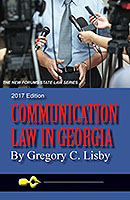Key Information
Communication Law in Georgia, 2017 Edition, By Gregory C. Lisby
2017 [ISBN: 1-58107-304-6; 314 pages soft cover; 5 1/2 x 8 1/2 inch] $36.95
 As every student of communication law knows, most of the law with which journalists and all citizens deal on a day-to-day basis originates not in our nation’s capital but in the statehouse. This is true even though the U.S. Supreme Court has “federalized” much of communication law, setting standards for the states to follow. Because these standards allow for differences of opinion and approach, laws affecting freedom of expression still vary significantly from state to state, and even more today than when Dewey Benefield published Georgia Laws and Cases Affecting Newspapers in 1955.
As every student of communication law knows, most of the law with which journalists and all citizens deal on a day-to-day basis originates not in our nation’s capital but in the statehouse. This is true even though the U.S. Supreme Court has “federalized” much of communication law, setting standards for the states to follow. Because these standards allow for differences of opinion and approach, laws affecting freedom of expression still vary significantly from state to state, and even more today than when Dewey Benefield published Georgia Laws and Cases Affecting Newspapers in 1955.
This book has been developed as a comprehensive examination of key communication law issues and problems in the state of Georgia. For more than twenty-five years, it has served as a primer or introduction to communication law in Georgia and a supplement to other books which discuss communication law from a national perspective. Because of continual changes in the law on all levels of government and in our understanding of those changes, this material will be updated regularly on the author’s web site.
This book has been prepared for reference use by journalists and students of Journalism and Communication, but should not be used as a substitute for legal counsel.
The Contents
- Freedom of Expression in Georgia
- Libel in Georgia
- Invasion of Privacy in Georgia
- Advertising Regulation in Georgia
- Free Press/Fair Trial in Georgia
- Reporter’s Privilege in Georgia
- Obscenity/Indecency in Georgia
- Open Meetings/Records in Georgia
The Author
Gregory C. Lisby, associate professor of communication at Georgia State University, holds a B.A. degree in journalism from Auburn University and a M.A. degree in journalism from the University of Mississippi. Prior to earning his Ph.D. from the University of Tennessee, he was awarded the U.T. Chancellor’s Citation for Extraordinary Academic Achievement and Professional Promise. He is currently finishing work on a J.D. degree in communication law at the G.S.U. College of Law. Dr. Lisby teaches communication law and policy, and communication ethics. A past member of the editorial board of American Journalism and past head of the Law Division of the Association for Education in Journalism & Mass Communication, he has had research published in Journalism Monographs, Journalism Quarterly, Journal of Communication Inquiry, Communication and the Law, Newspaper Research Journal, and Georgia Historical Quarterly. He has just completed a PBS documentary on film censorship. Dr. Lisby is a member of the National Honor Society of Phi Kappa Phi; Tau Kappa Alpha, national journalism/mass communication honor society; Blue Key National Honor Fraternity; and Golden Key National Honor Society.
